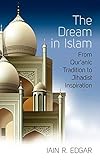The Dream in Islam : From Qur'anic Tradition to Jihadist Inspiration / Iain R. Edgar.
Material type: TextPublisher: New York ; Oxford : Berghahn Books, [2011]Copyright date: ©2011Description: 1 online resource (178 p.)Content type:
TextPublisher: New York ; Oxford : Berghahn Books, [2011]Copyright date: ©2011Description: 1 online resource (178 p.)Content type: - 9780857452351
- 9780857452368
- BP190.5.D73 E34 2011
- online - DeGruyter
| Item type | Current library | Call number | URL | Status | Notes | Barcode | |
|---|---|---|---|---|---|---|---|
 eBook
eBook
|
Biblioteca "Angelicum" Pont. Univ. S.Tommaso d'Aquino Nuvola online | online - DeGruyter (Browse shelf(Opens below)) | Online access | Not for loan (Accesso limitato) | Accesso per gli utenti autorizzati / Access for authorized users | (dgr)9780857452368 |
Frontmatter -- Contents -- Acknowledgments -- Preface to the Paperback Edition -- Foreword. Anthropological Skepticism Encounters Dreamed Realities Following Fieldwork in Pakistan -- Introduction -- Chapter 1. Context and History: Dreams as Perceived Metaphysical and Divinatory Knowledge in Islam -- Chapter 2. Methodology -- Chapter 3. Istikhara: Islamic Dream Incubation -- Chapter 4. Sufism and Dreaming -- Chapter 5. Militant Jihadist Dreaming in the Middle East and the United Kingdom -- Chapter 6. Dreams of Mullah Omar, Taliban Leader -- Chapter 7. Dream Interpretation Resources (Dictionaries) in Islam -- Chapter 8. A Comparison of Islamic Dream Theory and Western Psychological Theories of the Dream -- Conclusion -- Epilogue. The Marriage of Heaven and Hell: Imagination, Creativity, and Political Agency in the Inspirational Night Dream in Islam -- Glossary -- References -- Index
restricted access online access with authorization star
http://purl.org/coar/access_right/c_16ec
The war in the Middle East is marked by a lack of cultural knowledge on the part of the western forces, and this book deals with another, widely ignored element of Islam—the role of dreams in everyday life. The practice of using night dreams to make important life decisions can be traced to Middle Eastern dream traditions and practices that preceded the emergence of Islam. In this study, the author explores some key aspects of Islamic dream theory and interpretation as well as the role and significance of night dreams for contemporary Muslims. In his analysis of the Islamic debates surrounding the role of “true” dreams in historical and contemporary Islamic prophecy, the author specifically addresses the significance of Al-Qaeda and Taliban dream practices and ideology. Dreams of “heaven,” for example, are often instrumental in determining Jihadist suicidal action, and “heavenly” dreams are also evidenced within other contemporary human conflicts such as Israel–Palestine and Kosovo–Serbia. By exploring patterns of dreams within this context, a cross-cultural, psychological, and experiential understanding of the role and significance of such contemporary critical political and personal imagery can be achieved.
Mode of access: Internet via World Wide Web.
In English.
Description based on online resource; title from PDF title page (publisher's Web site, viewed 25. Jun 2024)


